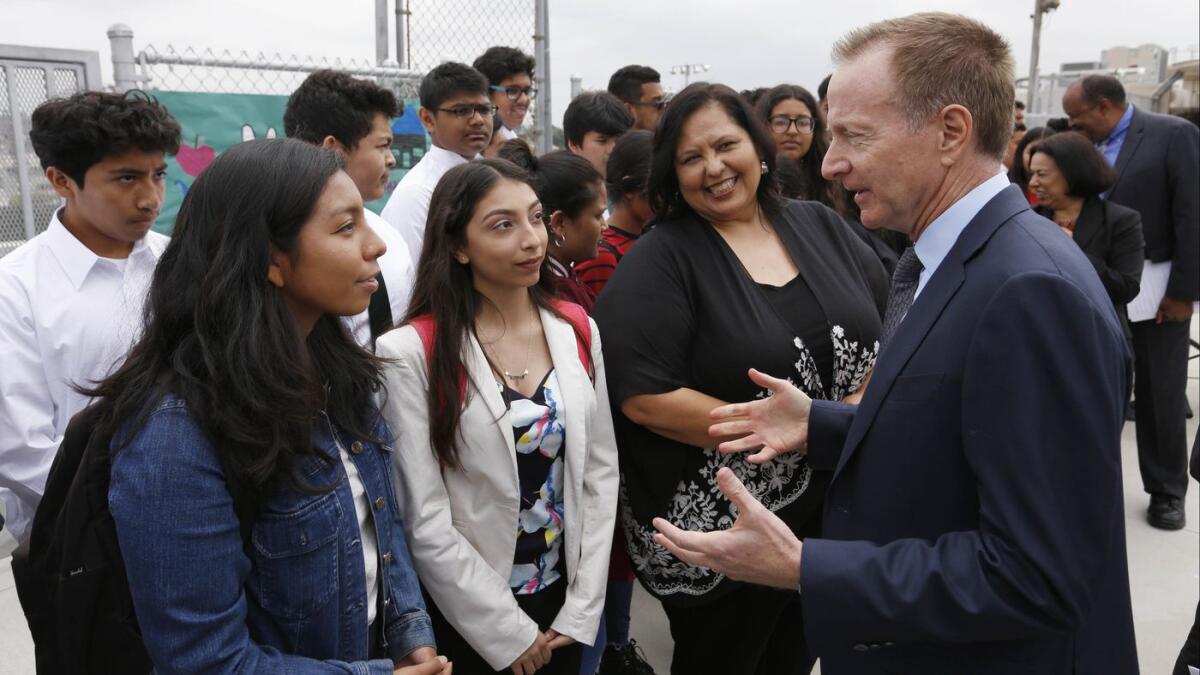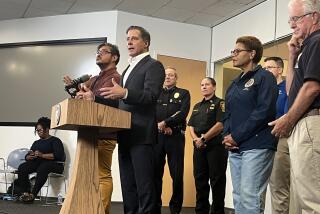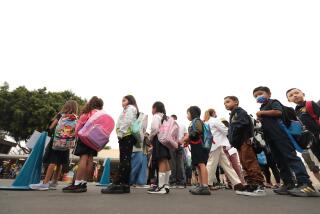L.A. schools chief Austin Beutner is performing admirably. But what comes after coronavirus?

- Share via
When the Los Angeles School Board chose Austin Beutner to lead the district in 2018, critics complained that he had no classroom experience, and cynics worried that he’d cede power to his wealthy charter school-supporting friends.
He was a Wall Street wunderkind; he made his first $100 million by age 33. But his education credentials were slim; his Vision to Learn philanthropy had provided eyeglasses to hundreds of thousands of students in schools across the country since 2012.
I’d seen Beutner at work during his brief stint as the L.A. Times publisher in 2014. He was smart and stubborn, righteously impatient and admirably forthright. When he was replaced a year later by our corporate overseers with someone more malleable, I was disappointed to see him depart.
Still, I couldn’t envision this soft-spoken, uber-wealthy white investment banker leading a chronically dysfunctional district, saddled with academic problems and loaded with underprivileged brown and black kids.
But today, during this coronavirus crisis, that school board hiring decision seems a bit like kismet. As other districts around the state are struggling to adapt to pandemic-driven restrictions, LAUSD — with a businessman at the helm — is using the crisis to strengthen its civic connections and its commitment to vulnerable communities.
The board gave Beutner emergency powers to swiftly fill the crater-sized holes that emerged when campuses were shuttered, teachers shifted gears, and families were forced to shelter at home.
The superintendent has used that authority to provide 2 million meals to children and adults each week, purchase as many as 200,000 laptops for children who don’t have computers at home, arrange free online connectivity for families that can’t afford internet service, and persuade local PBS television stations to carry daily programs aligned with students’ learning goals.
He reached out for help to his network of business and charitable sources with an urgency that’s a clear break from the district’s foot-dragging past.
“We don’t need to deliberate for weeks or months or years,” Beutner told me last week, as he prepared for a district telethon that would generate more than $4 million.
The school system “has a lot of rules, way too many rules,” Beutner said. “We’re solving the problem of how do you set up a lifeline for the community. You free yourself from prior restrictions. … You say, let’s just do good.”
::
I’m not naive enough to believe that his good-doing will be enough to blunt the academic losses that months away from campus entail. The district’s entrenched achievement gaps won’t disappear just because poor kids finally have computers.
If anything, extended school closures may exacerbate academic inequities. I was stunned by district estimates that one-quarter of its students had no internet access at home. They can text and watch videos and Google information on their phones, but cyberlearning options are limited for them.
The emergency initiatives to bridge those economic gaps are confronting limitations as well: The technology has been hobbled by limited teacher and student training and inadequate infrastructure. The food program went forward, but only after the family resource centers that Beutner thought were crucial were canceled because large gatherings were barred.
And considering how quickly the assistance was rolled out, key details — like who will pay for what — have yet to be hammered out.
I’m sure I’ll hear from readers who question Beutner’s focus on uplift, given the basics the district lacks: The school system is not a food bank; you don’t have to feed everybody. Why spend so much money on laptops when kids need nurses, librarians and books?
Beutner is not afraid of pushback. “I’ll see my way to the exit if [district leaders] tell me you shouldn’t be feeding hungry families and kids,” he said.
“I believe there’s talent in every one of our students. Our goal has to be to match that talent with opportunity. ... We’re changing because we needed to change. ”
The initiatives have already improved the image of a school board known mostly for micromanaging and delivered a win to an antsy teachers union, which had tangled with the district over prescriptive online teaching rules.
Now teachers will be able to create their own weekly schedules and lesson plans, instead of relying only on live video conferencing tools. They hope that will help them connect with the thousands of students who’ve been silent since district campuses closed.
“There’s no substitute for being in the classroom,” Beutner acknowledges. But we’re trapped in a moment where learning is not about what happens in the classroom, but what’s happening in homes and neighborhoods.
And in a school district where vision seldom translates to action and even the best plans tend to stall, the superintendent’s moves could seed a critical culture shift — away from infighting and toward creativity.
For too long, the district has been run like “a blood sport,” Beutner said. “It’s ‘Are you a Hatfield or a McCoy?’ Everybody’s been burned; people retreat to their corners. In a crisis, we can’t operate like that.”
The restrictions the coronavirus imposed have clarified the district’s responsibilities and spotlighted student needs. Beutner, to his credit, is addressing those things; he sees hurdles where others see walls.
But the real test will come when the health threat subsides and we get back to our normal lives. Because the coronavirus brought light to another threat, one that we’ve allowed to persist: There’s an academic emergency in the nation’s second-largest school district.
More to Read
Sign up for Essential California
The most important California stories and recommendations in your inbox every morning.
You may occasionally receive promotional content from the Los Angeles Times.















